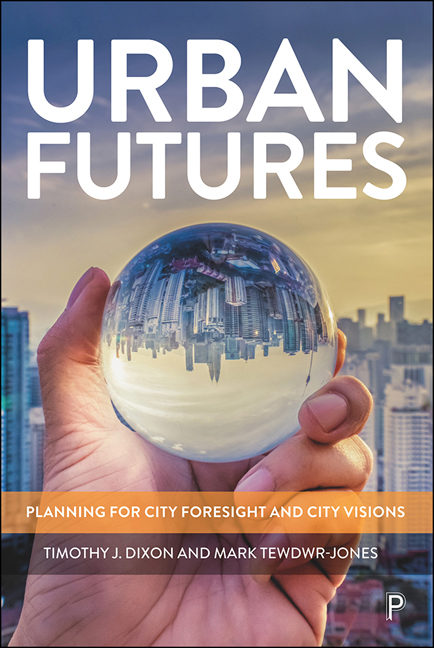Book contents
- Frontmatter
- Contents
- List of figures, tables and boxes
- Acknowledgements
- Foreword
- Preface
- 1 Urban futures: planning for city foresight and city visions
- 2 Cities and integrated urban challenges
- 3 Reimagining the city: views of the future from the past and present
- 4 Planning and governing the future city
- 5 Future narratives for the city: smart and sustainable?
- 6 Theoretical approaches to urban futures
- 7 Using city foresight methods to develop city visions
- 8 Shaping the future: city vision case studies
- 9 The innovative and experimental city
- 10 Visioning and planning the city in an urban age: a reality check
- 11 Conclusions: facing the urban future to 2050 and beyond
- Appendix: selected examples of city visions
- Notes
- References
- Index
Foreword
Published online by Cambridge University Press: 21 December 2021
- Frontmatter
- Contents
- List of figures, tables and boxes
- Acknowledgements
- Foreword
- Preface
- 1 Urban futures: planning for city foresight and city visions
- 2 Cities and integrated urban challenges
- 3 Reimagining the city: views of the future from the past and present
- 4 Planning and governing the future city
- 5 Future narratives for the city: smart and sustainable?
- 6 Theoretical approaches to urban futures
- 7 Using city foresight methods to develop city visions
- 8 Shaping the future: city vision case studies
- 9 The innovative and experimental city
- 10 Visioning and planning the city in an urban age: a reality check
- 11 Conclusions: facing the urban future to 2050 and beyond
- Appendix: selected examples of city visions
- Notes
- References
- Index
Summary
Many years ago, I learned from a distinguished American city planner and good friend, Britton Harris, that planning involved three kinds of thinking: policy, design and analysis. Essentially, what are we trying to achieve or what problems are we trying to solve, how can we invent plans to achieve these goals or solve the problems, and can we root this in good analysis? Harris observed that a problem in planning was that you very rarely found the three kinds of thinking in the same room together. That has been part of my intellectual toolkit ever since; and the gist of that argument still holds. It is the ‘design’ element that is neglected relative to policy and problem-solving on the one hand and analysis on the other. The authors of this book position themselves perfectly to fill this gap, and indeed, do get all three kinds of thinking into the one room – in this case the book! ‘Foresight’ is rooted in the articulation of problems and objectives – policy; and ‘visioning’ is ‘design’ for the city of the future. Great care is taken here to root this in the science of cities – analysis. To develop this framework is a substantial achievement in itself and this is combined with an ability to draw on the authors’ experience to flesh out the substance in innovative ways. In looking forward, the argument is rooted in the works of past thinkers and this provides a platform on which to build a new integrated perspective.
So far so good, but how can this scheme be implemented? The trap of ‘futurology’ is avoided by emphasising that this is not a book that is offering predictions. There is another key idea here: while the obvious uncertainties rule out predictions, the way forward is to construct alternative scenarios. If some of these can be demonstrated as in principle ‘good’, and others ‘not good’, then there is a planning challenge for the present: how can we do things now that will help us to steer towards the ‘good’ and away from the ‘bad’? The authors introduce us to the ideas of ‘transformation theory’: what are the routes from A to B? From the present to a desirable future? To achieve positive transformations, ‘real’ community engagement is vital – and very difficult.
- Type
- Chapter
- Information
- Urban FuturesPlanning for City Foresight and City Visions, pp. vii - viiiPublisher: Bristol University PressPrint publication year: 2021



